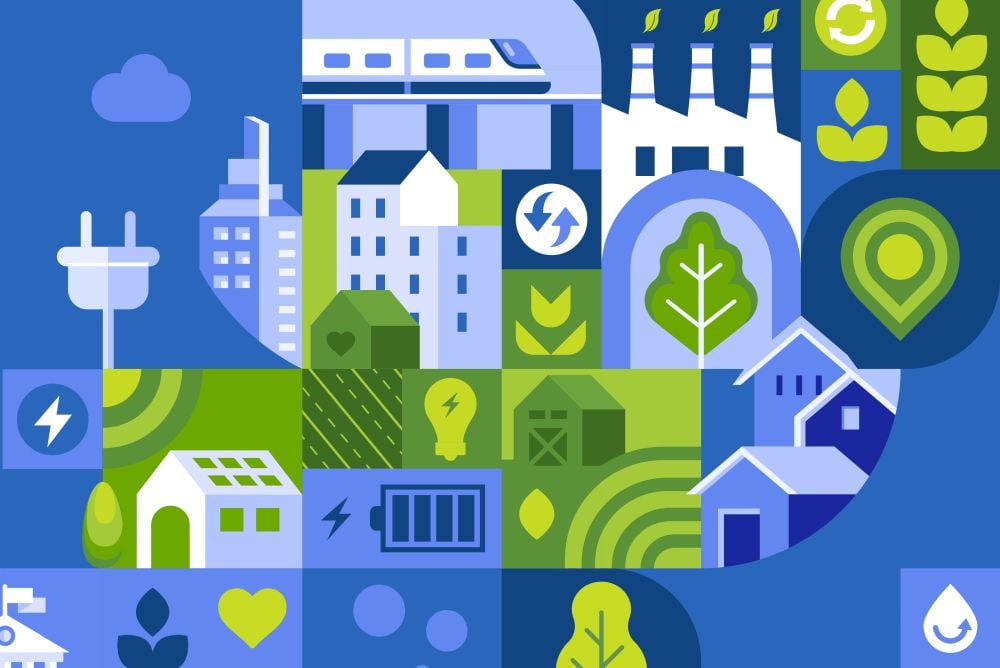The planet is burning. The Intergovernmental Panel on Climate Change’s warnings about the consequences of rising temperatures are becoming increasingly dire. And Russia’s invasion of Ukraine has set off a race in Europe and elsewhere to achieve energy independence through rapid transformations of the economy.
With decarbonization becoming such an urgent priority, it is tempting to consider political shortcuts. Why not try enlightened despotism or “epistocracy” (rule by experts), picking the best climate scientists and engineers and empowering them to make the decisions for us? Why not embrace the Chinese method of forcing through sweeping changes and swatting away any misguided resistance from below?
In fact, there can be no decarbonization without democratization. As urgent as solutions to climate change have become, so, too, has the need to address the growing disenchantment with democracy. Without rehearsing all the various indicators of democratic disillusionment – from unfavourable public sentiment to the rise of voter abstention and declining trust in elected politicians and public institutions – it is clear that many people now regard democracy as more of a problem than a solution.
Technocratic temptation
If people do not trust their elected representatives to address fundamental policy issues such as national security, public health, education and so forth, how would they ever trust them to manage something as massive, long-term and multi-dimensional as climate change? A seemingly reasonable alternative is to turn to the same experts and scientists who have been warning about the dangers of climate change for several decades now.
The apparent advantages of an epistocratic approach are twofold. First, in addition to knowing more than anyone else about climate change, climate scientists and adjacent experts would be able to follow the science, uninfluenced by vested interests, climate sceptics, ignorant and irrational voters, or social movements that resist the economic costs of change. Knowledgeable, efficient and effective policies and laws to curb carbon emissions would be guaranteed.
Second, leaders who are unencumbered by mechanisms of democratic accountability can act swiftly and decisively. As we saw during the early stages of the Covid-19 pandemic, China’s authoritarian government was able to control the virus by imposing massive quarantines on millions of people, building new hospitals in the space of just days, and sending masks and expert teams abroad to help other countries. Meanwhile, most electoral democracies seemed to fumble early management of the crisis, even if most eventually caught up.
What would a climate epistocracy look like? Imagine that, in the face of rapidly rising temperatures and increasingly destructive climate events (mass-death “wet bulb” heatwaves, catastrophic flooding, drought-induced famines), the international community creates a Global Climate Council comprising relevant experts from prestigious universities around the world.
With enough power, this panel could rapidly implement carbon abatement policies and override any national legislation that it deems incompatible with its own plans (perhaps with the support of similarly epistocratic local climate councils). Though this would likely mean sacrificing millions of jobs or depriving some populations of necessary goods and services, these costs would be justified in the name of saving the planet for the rest of humanity and future generations. What would be wrong about this?
Two big problems stand out. First, while climate change is often conceptualized as “one” issue, it is in fact many interrelated issues touching on every possible domain of life (agriculture, industry, finance, transportation, energy, education, reproduction and so on). A niche of independent decision-making that would be strictly related to climate is implausible. The sheer complexity of the issue would introduce all kinds of uncertainties (beyond the intrinsic uncertainty of climate modelling). In the end, climate change would have to be recognized as merely one of many issues that bear on humanity’s future. In this broader, fuzzier context, it would not be clear that experts have more authority than laypeople.
Second, and more important, climate change is not just a technical issue of prediction, which is why it is a mistake to frame the challenge as a simple question of, “How do we achieve carbon neutrality by 2050?” The burdens of widespread decarbonization can be distributed many ways, which means that fighting climate change will always be an eminently political process involving questions of justice and equity. Who should sacrifice what, and for whose benefit?
These are also difficult moral questions. We must make decisions about not just complex chains of physical causality but also about what and whom we should value. While experts will have a lot to say about causal chains, they have no authority to dictate answers to the second category of questions.
The fate of French President Emmanuel Macron’s carbon tax in 2018 illustrates the limits of an epistocratic approach. In theory, a carbon tax is a great way to nudge people away from fossil fuels. In practice, it often invites a political backlash because its effects are unevenly distributed. In Macron’s case, the “yellow vests” (gilets jaunes) objected to a fuel tax increase that seemed to punish urban working-class commuters while sparing wealthier city dwellers.
At the global level, a cap-and-trade policy may seem like a great way to reduce carbon-dioxide emissions and other pollutants in the aggregate. Yet from the standpoint of justice, it raises obvious questions. Why should the industrialized countries that are most responsible for climate change be allowed to continue polluting at all? Why should developing countries from the Global South bear the costs of decarbonization, especially when they are already suffering the effects of longstanding economic exploitation and injustice at the hands of the Global North?
There are no easy answers to such questions, but one thing is clear: putting an epistocracy of scientists in charge of such decisions is likely to make things worse.
Justice imperative
Merely acknowledging that climate change ultimately is a matter of justice is not enough. The term “climate justice”, critics note, falsely implies that the issue occurs only at the global level and in the aggregate. But for most people, further down the chain of power, climate change is really about local problems like air pollution, toxic water, rising sea levels and the differential exposure of some communities – typically black, brown and indigenous – to such ills. And, beyond the question of greenhouse-gas emissions and rising temperatures, there are also the related issues of biodiversity loss, pollution and general quality of life.
Moreover, climate justice is not just a matter of distributive justice but also of corrective justice. History and geography have placed some countries in the position of being most responsible for climate change, and others in the position of being primarily its victims. These historical and geographical patterns also intersect with racial and colonial legacies. Philosopher Olúfẹ́mi Táíwò thus argues that climate justice should be tied to the question of reparations for slavery and colonization, both between and within countries.
These issues require a more localized lens. The Native American journalist Dina Gilio-Whitaker notes that “environmental justice” is a better term, because it focuses the debate on people’s immediate surroundings rather than on an abstract entity like climate. Environmental justice requires that we think in a more human- and community-centred way, in terms of the right to healthy, non-polluted environment. As the environmental policy scholar Michael Méndez notes in his book “Climate Change from the Streets”, this is a way of “humanizing climate change”.
To address climate change, we need to frame questions in ways that do not separate the technical, causal, and instrumental aspects from values and local environmental concerns. Instead of asking, “How do we get to net zero by 2050?” we should ask, “How do we get to net zero, preserve a healthy environment, and conserve biodiversity, while also ensuring that our solutions are fair to all affected communities, and that they account for pre-existing patterns of injustice?”
Macron’s government appears to have partly absorbed this lesson. Its 2019-20 Citizens’ Convention on Climate posed a question with a clear value dimension: “How to reduce France’s greenhouse gas emissions by 40% of their 1990s level by 2030 in a spirit of social justice.” In the event, the 150 participants insisted on going further, by reintroducing the question of biodiversity, rights for the environment, and recognition of the crime of “ecocide”.
These additions in part reflected the presence of representatives from the French ultramarine territories, which represent 70% of French biodiversity and have been poisoned by a carcinogenic pesticide known as chlordecone. The ultramarine citizens in the convention fought to put these issues front and centre, correcting for metropolitan participants’ blind spots.
There is no alternative
Given these issues and real-world examples, it should be obvious that the argument for epistocracy is in fact an argument for autocracy. The attraction of an epistocracy is not that the experts will actually rule best; it is that they will be able to decide without having to consult the larger population. Their advantage is speed and efficiency, not knowledge per se (much less wisdom).
This brings us to the reason why decarbonization cannot succeed without democratization. Even if we accept that epistocracy can reach decisions faster, this is an advantage only if decisions face no resistance. But that will almost never be the case.
What good is a swiftly implemented carbon tax if it triggers massive social protests that paralyze the country for months? When the yellow vests stormed the streets of Paris, the authorities had to resort to police repression. In the end, the government caved in to popular pressure and took the only other viable option: talking and listening.
This alternative took two complementary forms: a Great National Debate that lasted two months and involved around two million people, and the Citizens’ Convention, where 150 randomly selected citizens generated 149 provisions to curb emissions and address related issues. On the basis of these proposals, the French parliament then produced its most ambitious climate bill ever.
The lesson is that even an elected government with some degree of legitimacy cannot force through a policy that the public deems profoundly unfair. The early-stage efficiency of a vertical approach to climate policymaking soon gets cancelled out by the long process of addressing popular opposition and restoring lost public trust.
To be sure, a sceptic might say: “Perhaps Macron should have kept using coercion until he broke the resistance. Imagine the impact his fuel tax could have had on emissions, not to mention all the government revenues it would have generated in the two and a half years of deliberation that took place instead.” But we should reject this authoritarian impulse and instead double down on an improved version of the democratic deliberative approach.
Open democracy
The lesson of the Great National Debate and the Citizens’ Convention is not that deliberative democracy takes too long and is ultimately ineffective; it is that such processes and bodies need to be empowered to ensure that their recommendations are implemented – including at the global level. Otherwise, they will reproduce the same kind of limited, performative citizen participation that one finds in many flawed electoral democracies today.
In my book “Open Democracy: Reinventing Popular Rule for the Twenty-First Century”, I offer an alternative to democratic governance centred around elected officials who engage with their voters only periodically (usually every few years). A better system, I argue, is centred around assemblies of ordinary citizens chosen by lot, who would remain in constant contact with the broader public.
In such a system, democratic feedback loops are revitalized, because politics is no longer primarily the business of professional politicians. Ordinary citizens are re-empowered as sources of law and policy. This model taps into the intuition behind ancient Greek democracy: namely, that each member of the demos is entitled to a say about the good of the polis (of course, membership in the demos would be far more inclusive now than it was two millennia ago).
My vision of open democracy rests on five institutional principles: participation rights, deliberation, majority rule, democratic representation, and transparency. From a practical standpoint, open democracy might still include a lot of institutions that we are familiar with, such as an elected executive and an appointed Supreme Court. But legislative power would rest in the hands of ordinary citizens rather than elected elites. Like ancient democracy, open democracies would be mostly run by what I call “lottocratic” representatives selected through civic lotteries.
Real-world experiments
Although there are no current examples of a fully open democracy, we do have ample evidence to show that bodies of randomly selected citizens can and do deliver good recommendations and even quasi-bills (as in France). As an influential 2020 Organization for Economic Cooperation and Development report shows, we can draw lessons from more than 300 cases of sortition-based deliberative processes around the world, many of which have focused on climate issues.
Two recent examples illustrate how ordinary citizens’ deliberations have moved politicians on environmental justice issues. In 2010, an assembly of 25 elected Icelanders considered recommendations from the broader public and ultimately produced a constitutional proposal that contains landmark provisions to protect the environment.
The preamble, for example, makes clear that the government should “respect the diversity of the life of the people, the country and its biosphere”, and that the people aspire “to work towards peace with other nations and respect for the earth and all mankind”. Specific articles then go on to declare that, “Everyone shall have the right to a healthy environment and nature where biodiversity is maintained,” and that “the right of nature and coming generations [shall] be respected.” More controversially, a key article declares that all natural resources that are not already privately owned will be deemed national property. Further articles grant citizens a right to information about the environment, as well as a right to participate in the preparation of future decisions that may bear on the environment or nature. These are all improvements not only on Iceland’s 1944 constitution but also on the set of expert-drafted proposals that the assembly considered as part of its deliberations.
The French Citizens’ Convention also showed that ordinary citizens can outperform both experts and elected officials. Its members heeded many expert recommendations, but they made them more compatible with social justice goals. They also rejected some expert recommendations, including the carbon tax, deemed both too unfair and controversial. And in delivering a cogent set of proposals, they outperformed the French parliament, which had never been able to produce an ambitious climate bill.
One illustrative example of how citizens tweaked a well-known expert recommendation to make it socially acceptable concerns retrofitting housing for energy efficiency. The convention’s final proposal was to make retrofitting mandatory by 2040, with various sanctions for homeowners who don’t comply, but also with fiscal solutions to help lower-income people renovate their homes.
Experts initially gave conflicting advice on this issue. While one social entrepreneur argued that a wholesale renovation approach would be more cost efficient in the long term, a representative from the Agency for National Habitation (whose main constituency is low-income families) defended a more gradual set of measures. The citizen assembly members were persuaded that a more ambitious approach was necessary to meet the emission reduction goal, but they also accounted for the social justice issue by including various redistributive measures.
The question now, of course, is whether the rest of the population will endorse proposals made by fellow citizens who were temporarily placed in the position of lottocratic representatives. In Iceland’s case, a referendum on the citizen assembly’s constitutional proposal was approved by two-thirds of the voting population (and on the specific question of whether natural resources should be nationalized, 80% responded yes).
In the French case, convention members were scared at the last minute into rejecting the option of submitting their proposals to a referendum; but a June 2020 poll established that all but one of their proposals enjoyed majority support. The retrofitting mandate, which was both the best lever to reduce carbon-dioxide emissions yet also one of the most coercive and individually costly proposals, met with surprisingly high 74% approval.
In an era of declining trust, people are unlikely to accept solutions to climate change from politicians and experts who seem remote and blind to their experiences. But real-world deliberative processes suggest that they will support the recommendations of mini-publics that look and think like them. In France, three out of five people deemed the convention legitimate to make proposals in their name.
Urgency of democratization
The fate of the Icelandic and French proposals speaks to the difficulties ahead. In Iceland, the constitutional reform was ultimately blocked by Parliament, which had come under pressure from lobbyists who objected to the nationalization of natural resources. And in France, only 25% (at most) of the convention’s recommendations have been enacted into law or incorporated into regulations, also owing largely to special interest lobbying. Most notably, the retrofitting mandate and recognition of the crime of ecocide were not adopted.
Though it may seem counterintuitive, the urgency of climate-change demands that we avoid further empowering any particular class of experts. Instead, we must radically democratize our systems at all levels to confer more power on ordinary citizens. That can be done through citizens’ assemblies on democratic renovation, constitutional reforms, and the creation of new institutions to tackle climate change.
At the global level, we can support (financially and otherwise) the next iteration of the Global Assembly on climate, which convened its first pilot session in October 2021 on the margins of COP26. The next version must be larger and more visible. We need to put more pressure on international institutions, and we need to put open democracy on the list of topics for US President Joe Biden’s next Summit for Democracy.
Hélène Landemore is a professor of political science at Yale University.
Copyright: Project Syndicate









